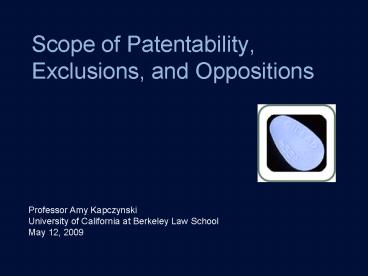Scope of Patentability, Exclusions, and Oppositions - PowerPoint PPT Presentation
1 / 11
Title:
Scope of Patentability, Exclusions, and Oppositions
Description:
Scope of Patentability, Exclusions, and Oppositions. Professor Amy Kapczynski ... Pre-grant Patent Oppositions ' ... Controller against the grant of patent on ... – PowerPoint PPT presentation
Number of Views:45
Avg rating:3.0/5.0
Title: Scope of Patentability, Exclusions, and Oppositions
1
Scope of Patentability, Exclusions, and
Oppositions
Professor Amy Kapczynski University of California
at Berkeley Law School May 12, 2009
2
Todays Program
- Basic requirements for patentability
- Exclusions from patentability
- Patent Oppositions and Revocation Proceedings
3
Patent Requirements
20 year right to exclude others
From making, using, selling, importing the
invention
- Must first show that the invention is
- novel
- involves inventive step (non-obvious )
- is capable of industrial application (useful)
4
(No Transcript)
5
U.S. Patents related to Kaletra
6
Worldwide Pharmaceutical Market by Region, 2005
CIPIH Report, data provided by IMS Health
7
Section 3(d) of Indian Patent Act
- The following are not inventions within the
meaning of this Act, - - d. the mere discovery of a new form of a known
substance which does not result in the
enhancement of the known efficacy of that
substance or the mere discovery of any new
property or new use for a known substance . . .
- Explanation.For the purposes of this clause,
salts, esters, ethers, polymorphs, metabolites,
pure form, particle size, isomers, mixtures of
isomers, complexes, combinations and other
derivatives of known substance shall be
considered to be the same substance, unless they
differ significantly in properties with regard to
efficacy
8
Article 27.1
- patents shall be available for any inventions,
whether products or processes, in all fields of
technology, provided that they are new, involve
an inventive step and are capable of industrial
application. - patents shall be available and patent rights
enjoyable without discrimination as to the place
of invention, the field of technology and whether
products are imported or locally produced. - May exclude diagnostic, therapeutic, and
surgical methods as well as plants and animals
other than microorganisms (Art. 27.3)
9
Article 27.2 and 27.3
- 2. Members may exclude from patentability
inventions, the prevention within their territory
of the commercial exploitation of which is
necessary to protect ordre public or morality,
including to protect human, animal or plant life
or health or to avoid serious prejudice to the
environment, provided that such exclusion is not
made merely because the exploitation is
prohibited by their law. - 3. Members may also exclude from patentability
- (a) diagnostic, therapeutic and surgical methods
for the treatment of humans or animals . . .
10
Pre-grant Patent Oppositions
- Where an application for a patent has been
published but a patent has not been granted, any
person may, in writing, represent by way of
opposition to the Controller against the grant of
patent on the ground - Lack of novelty
- Lack ot inventive step
- Subject matter is not patentable
- Failure to disclose certain required information
to the patent office, - Etc
11
Article 62
- 1. Members may require, as a condition of the
acquisition or maintenance of the intellectual
property rights . . . compliance with reasonable
procedures and formalities. Such procedures and
formalities shall be consistent with the
provisions of this Agreement. - 2. Members shall ensure that the procedures for
grant or registration, subject to compliance with
the substantive conditions for acquisition of the
right, permit the granting or registration of the
right within a reasonable period of time so as to
avoid unwarranted curtailment of the period of
protection.































